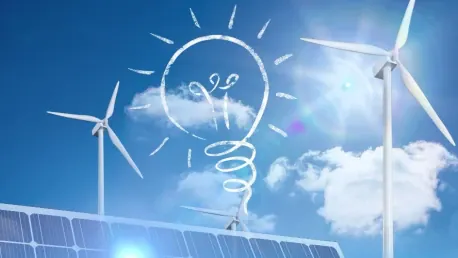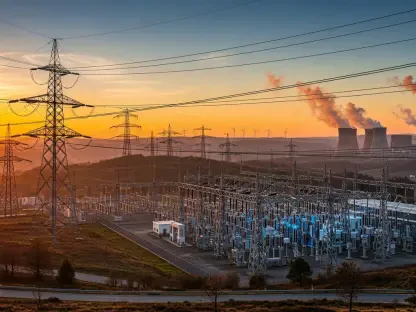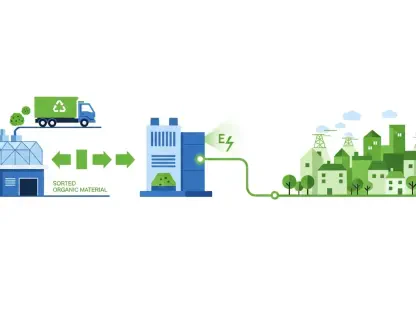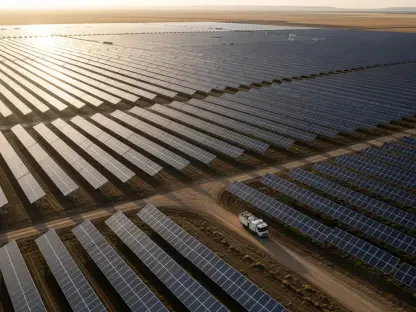Hungary is making significant strides towards its renewable energy goals, with a strong focus on solar power. However, the intermittent nature of renewable energy sources presents a challenge. To address this, Hungary is turning to advanced energy storage solutions like NAS batteries. NGK INSULATORS, LTD. (NGK) has recently received an order for NAS batteries from Greenergy Triotechnik Kft., a renewable energy provider in Hungary. These batteries are set to play a crucial role in stabilizing the energy supply and supporting Hungary’s carbon neutrality ambitions.
Hungary’s Renewable Energy Commitment
National Goals and Solar Power Potential
Hungary has set ambitious targets for renewable energy, aiming for carbon neutrality by 2050 and for 90% of its power generation to come from low-carbon sources by 2030. The country benefits from long hours of sunlight, making solar power a key component of its renewable energy strategy. The considerable availability of sunlight positions Hungary as an ideal environment for solar power generation. However, the variability in solar energy production necessitates significant advancements in energy storage to ensure a steady supply of power, overcoming the inconsistencies brought on by weather fluctuations and the day-night cycles.
The commitment to these goals is further evidenced by the legislative support and policy frameworks put in place by the Hungarian government to promote renewable energy advancement. The government has rolled out multiple incentives and subsidies encouraging investments in solar power infrastructure. However, without an efficient method to store surplus energy produced during peak sunlight hours, transforming these ambitious goals into a reliable energy supply could prove challenging. The initiative to deploy NAS batteries represents a significant step towards addressing this challenge, supporting Hungary’s pathway to a predominantly low-carbon energy economy.
Challenges of Renewable Energy Integration
The European energy grid faces challenges in consistently meeting energy demands due to the fluctuating nature of renewable energy production. This inconsistency can lead to energy wastage and supply instability. One of the primary challenges in integrating renewable energy is the inability to predict and synchronize energy supply with fluctuating demand patterns effectively. Solar power, for example, generates peak energy during daylight hours, but energy consumption often peaks in the evening when solar power production is minimal. Consequently, this mismatch leads to surplus energy wastage during the day and shortages during peak consumption periods.
Additionally, the European grid infrastructure was not initially designed to accommodate the erratic and decentralized nature of renewable energy sources, making the integration process more complex. High-capacity storage solutions like NAS batteries, which can store surplus power and release it during demand surges, are essential. These batteries not only mitigate the energy supply’s variability but also enhance the reliability and stability of the power grid. With advanced storage solutions in place, Hungary can better manage its renewable energy resources and align production with consumption effectively, thus reducing power wastage and ensuring a consistent energy supply.
The Role of NAS Batteries
Order and Installation Details
NGK has received an order for NAS batteries to be installed at the IP Energy Kiskunfélegyháza Solar Park in Bács-Kiskun County. The installation will include two container-type NAS battery units with a maximum output of 500 kilowatt DC and a total capacity of 2,900 kilowatt-hours DC. These batteries will help control renewable energy output fluctuations and reduce energy wastage. With operations expected to commence in June 2025, the installation of these NAS battery units marks a critical milestone in Hungary’s transition to a robust and resilient renewable energy framework. This strategic installation aims to harness the surplus energy generated during peak sunlight hours and store it efficiently for use during periods of high demand or low production.
Moreover, the deployment of these high-capacity batteries is specifically designed to address the volatility of solar power generation, thereby ensuring a continual and stable power supply. The stored energy can be used during cloudy days or nighttime when solar output is low, thereby smoothing out the peaks and troughs in energy production and consumption. As Hungary marches towards its renewable energy goals, the strategic deployment of NAS batteries is a crucial step in aligning the renewable energy supply with demand, effectively minimizing wastage and optimizing the use of its solar power resources.
Technical and Safety Features
NAS batteries are known for their substantial capacity and long-term discharge capabilities. They are designed with superior safety features and comprehensive monitoring systems, meeting stringent safety standards required for installation at electric power stations. The advanced safety features of NAS batteries include multiple certifications such as UL 1973, a standard for stationary storage battery safety, and UL 9540A, a test method for evaluating thermal runaway fire propagation in battery energy storage systems. These certifications affirm their ability to safely operate under a wide range of conditions, ensuring reliability when integrated into the energy grid.
Beyond safety, the technical prowess of NAS batteries lies in their ability to deliver high energy density and extended lifecycle compared to conventional battery systems. Each unit boasts comprehensive equipment monitoring, which allows for constant condition checks, thereby preempting potential failures. This advanced monitoring not only guarantees safety but also enhances longevity and performance, making NAS batteries a dependable choice for energy storage. The superior discharge capabilities enable these batteries to deliver sustained power over longer durations, making them an excellent fit for applications that require consistent power supply, such as stabilizing renewable energy outputs and balancing grid supply-demand dynamics.
Global Deployment and Applications
Proven Track Record
NAS batteries have been in operation for over 20 years, with installations in more than 250 locations worldwide. They are used in various applications, including stabilizing renewable energy, balancing power demand and supply, and serving as emergency power sources. The broad deployment of NAS batteries signifies their established reliability and effectiveness in diverse operational contexts. Their consistently high performance in stabilizing energy supply and managing power fluctuations has positioned them as a trusted storage solution globally. The cumulative deployment of NAS batteries worldwide totals an output of over 720,000 kW and a capacity of approximately 5.0 million kWh.
This extensive track record underscores their robustness, durability, and capability to adapt to varied environmental and operational conditions. Their proven reliability over decades of use, coupled with their technical specifications, has made NAS batteries a preferred choice for many large-scale renewable energy projects. By leveraging this robust and time-tested technology, countries like Hungary can significantly enhance the efficiency of their renewable energy systems, ensuring a steady, reliable energy supply while pushing towards their sustainability goals.
Benefits for Hungary
The deployment of NAS batteries in Hungary will help stabilize the energy supply and optimize the use of renewable energy resources. By reducing energy wastage and ensuring a consistent power supply, NAS batteries support Hungary’s renewable energy goals and contribute to the country’s carbon neutrality efforts. Their integration into the energy grid acts as a buffer against the intermittent nature of renewable energy sources, dramatically improving grid stability. The ability to store surplus energy generated during peak production periods and release it during high-demand phases ensures that the energy generated is utilized effectively without wastage.
Additionally, the deployment of NAS batteries can help mitigate the need for traditional backup power sources, often reliant on fossil fuels, thereby reducing greenhouse gas emissions. This transition not only supports Hungary’s carbon neutrality ambitions but also reduces reliance on external energy sources, enhancing energy security. As Hungary continues to expand its renewable energy capacity, especially through solar power, the role of NAS batteries in balancing the supply-demand equation will become increasingly vital. Their benefits extend beyond just energy storage, offering a pathway to a more resilient and sustainable energy infrastructure.
Industry and Market Perspective
Collaborative Efforts
The order placed by Greenergy Triotechnik Kft. and the involvement of Duna Center Therm Uzemi Szolgaltato Kft. highlight the collaborative efforts within the energy sector to harness renewable energy effectively in Hungary. These partnerships underscore the importance of cooperation between various stakeholders to achieve common energy goals. Such collaborative dynamics ensure that the best practices, resources, and technological advancements are utilized, propelling the renewable energy agenda forward efficiently. By leveraging the combined expertise and capabilities of different entities, projects like the IP Energy Kiskunfélegyháza Solar Park can achieve optimal operational efficiencies and maximum impact.
The recognized advantages of NAS batteries, including their high energy density, prolonged lifecycle, and proven safety standards, make them invaluable for grid storage and renewable energy projects. These attributes make NAS batteries a preferred solution for handling the complexities associated with renewable energy integration, particularly in stabilizing energy grids and ensuring a reliable power supply. The collaborative efforts reflect a cohesive strategy aimed at overcoming the inherent challenges of renewable energy production, paving the way for a more resilient and sustainable energy future in Hungary.
Future Demand
The increasing reliance on renewable energy sources and the need for reliable storage solutions suggest a growing market for NAS batteries in Hungary and internationally. As renewable energy projects expand, the demand for high-capacity and reliable energy storage systems will inevitably rise. The transition towards a sustainable energy framework necessitates storage solutions that can accommodate large scale, intermittent power supplies and deliver consistent energy when required. Prior orders for NAS batteries within Hungary, such as those for a demonstration project at the Centre for Energy Research, indicate their expanding utilization and anticipated future demand.
Moreover, as technologies evolve and economies of scale kick in, the cost-effectiveness of NAS batteries will likely improve, further driving adoption rates. The broader energy market is expected to see similar trends, with many countries pushing towards renewable energy targets that demand efficient storage solutions to bridge the supply-demand gap. As more renewable energy projects come online and storage technologies continue to advance, the critical role of NAS batteries in facilitating a smooth, stable, and efficient shift towards renewable energy cannot be overstated. Their expanding application and proven effectiveness position them at the forefront of the energy storage sector, ready to meet the demands of a rapidly transforming energy landscape.
Hungary’s Renewable Energy Pathway
Solar Power Growth
Hungary’s solar power capacity is projected to increase from around 5,000 MW annually to approximately 12,000 MW by 2030. Despite favorable conditions for solar power generation, the variability of renewable energy production poses challenges for market stability. The rapid expansion of solar power capacity underscores Hungary’s commitment to leveraging its natural resources effectively. This growth trajectory necessitates parallel advancements in energy storage to handle the increasing volume of intermittent solar power. The projected rise in capacity signifies the country’s proactive approach to scaling up renewable energy production in alignment with its carbon neutrality targets.
However, this ambitious growth also highlights the need for enhanced grid management and energy storage solutions to mitigate the fluctuations in power output. The integration of NAS batteries will play a pivotal role in achieving this balance by enabling the grid to absorb and store surplus energy during peak production periods and release it when demand surges. By addressing these fluctuations, NAS batteries contribute significantly towards maintaining grid stability and enhancing the reliability of the energy supply, ensuring that the increasing solar power capacity directly translates into consistent and sustainable energy for consumers.
Optimizing Renewable Energy Use
By deploying NAS batteries, Hungary aims to eliminate energy waste and optimize the use of its renewable energy resources. These batteries will help balance the supply and demand of energy, supporting the country’s efforts to achieve its renewable energy targets and carbon neutrality goals. Effective energy storage solutions ensure that every unit of power generated is either utilized or stored for future use, thereby enhancing the overall efficiency of the renewable energy system. This optimization not only reduces wastage but also enhances the economic viability of renewable energy projects by maximizing the return on investment for generated power.
Additionally, the ability to store energy and release it during high-demand periods can mitigate the need for supplementary fossil fuel-based power generation, thereby reducing greenhouse gas emissions and supporting environmental sustainability. The deployment of NAS batteries represents a strategic move towards creating a sustainable energy ecosystem where renewable energy is harnessed, stored, and utilized in the most efficient manner possible. This strategy is crucial for Hungary as it accelerates its transition to a low-carbon economy, reinforcing its position as a leader in renewable energy adoption and innovation.
Conclusion and Future Outlook
Hungary is making notable progress in achieving its renewable energy targets, with a pronounced emphasis on solar power. However, the intermittent nature of renewable energy sources, like solar power, poses a significant challenge. To address this issue, Hungary is increasingly adopting advanced energy storage solutions such as NAS batteries. NGK INSULATORS, LTD. (NGK) has recently secured an order from Greenergy Triotechnik Kft., a Hungarian renewable energy provider, for these cutting-edge NAS batteries. These batteries are expected to play an essential role in stabilizing the energy supply, ultimately supporting Hungary’s carbon neutrality goals. By incorporating NAS batteries, Hungary aims to ensure a more reliable and efficient energy network, crucial for maintaining steady power availability despite the fluctuating nature of solar energy. The adoption of such advanced storage solutions is a critical step in Hungary’s broader strategy to enhance its renewable energy infrastructure and reduce its carbon footprint.









